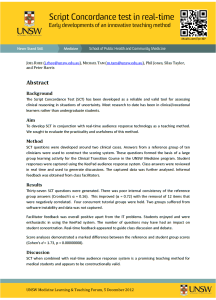 Abstract: Click here to download PDF
Abstract: Click here to download PDF
This short paper was presented at the UNSW Medicine Learning and Teaching Forum, on 5 December 2012.
Presenting authors: Joel Rhee and Michael Tam
Other authors: Phil Jones, Silas Taylor, and Peter Harris.
Abstract
Background
The Script Concordance Test (SCT) has been developed as a reliable and valid tool for assessing clinical reasoning in situations of uncertainty. Most research to date has been in clinical/vocational learners rather than undergraduate students.
Aim
To develop SCT in conjunction with real-time audience response technology as a teaching method. We sought to evaluate the practicality and usefulness of this method.
Method
SCT questions were developed around two clinical cases. Answers from a reference group of ten clinicians were used to construct the scoring system. These questions formed the basis of a large group learning activity for the Clinical Transition Course in the UNSW Medicine program. Student responses were captured using the KeePad audience response system. Class answers were reviewed in real time and used to generate discussions. The captured data was further analysed. Informal feedback was obtained from class facilitators.
Results
Thirty-seven SCT questions were generated. There was poor internal consistency of the reference group answers (Cronbach’s α = 0.16). This improved (α = 0.72) with the removal of 12 items that were negatively correlated. Four concurrent tutorial groups were held. Two groups suffered from software instability and data was not captured.
Facilitator feedback was overall positive apart from the IT problems. Students enjoyed and were enthusiastic in using the KeePad system. The number of questions may have had an impact on student concentration. Real-time feedback appeared to guide class discussion and debate.
Score analyses demonstrated a marked difference between the reference and student group scores (Cohen’s d = 1.73, p = 0.00000008).
Discussion
SCT when combined with real-time audience response system is a promising teaching method for medical students and appears to be constructionally valid.
